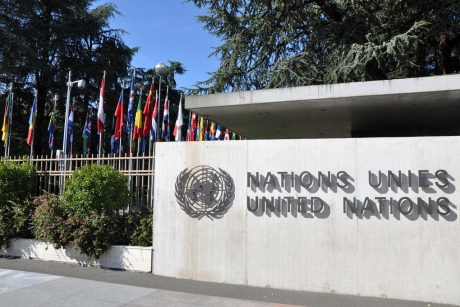European anti-trafficking day: “Human beings with human rights that must be protected”
Three key international anti-trafficking expert mechanisms called for a concerted global response to fight the transnational scourge of trafficking in persons.

The United Nations Office at Geneva, 6 August 2010.
“Partnership is the backbone for effective co-ordinated efforts to implement a human-rights based approach while addressing this multi-faceted phenomenon,” they said on the occasion of the European Anti-Trafficking Day.
“Co-operation between origin, transit and destination countries, but also with regional and international mechanisms, as well as private stakeholders such as multinational corporations and civil society organizations, is essential for comprehensive responses to trafficking in persons,” stressed the human rights experts from the United Nations, the Council of Europe and the Organization for Co-operation and Security in Europe (OSCE).
The UN Special Rapporteur on trafficking in persons, especially women and children, Joy Ezeilo, reasserted that “Trafficking in itself is a grave violation of human rights which leads to further violations of fundamental rights.”
“The rights of victims should be the beating heart driving all efforts towards eradicating this phenomenon which leads thousands of women, girls, men and boys in situation of profound exploitation and violence,” Ezeilo said. “The victims, whose rights are stolen, have to be protected, assisted, provided remedies, and re-integrated.”
The President of the Council of Europe Group of Experts on Action against Trafficking in Human Beings (GRETA), Nicolas Le Coz, emphasized that “States have a responsibility under international and European law to provide protection to these victims of serious rights violations in order to ensure their moral and physical integrity and prevent re-victimization including by duly prosecuting and punishing the traffickers”.
“Given the worrying proportions human trafficking has taken, there is a need to move from a national security model to a human rights-based approach in order to better identify and assist victims of trafficking who are often undocumented migrants,” the President of GRETA said.
For the OSCE Special Representative and Co-ordinator for Combating Trafficking in Human Beings, Maria Grazia Giammarinaro, “the realization of a victim’s right to effective remedies is at the core of the human rights-based approach as redress and compensation are the key stepping stones on the path to full recovery and social inclusion without fear or stigma.”
The three international expert mechanisms stressed that “a universal human rights-based approach is paramount to end human trafficking in the world.”
Source: Organization for Security and Co-operation in Europe
- 383 reads
Human Rights
Fostering a More Humane World: The 28th Eurasian Economic Summi

Conscience, Hope, and Action: Keys to Global Peace and Sustainability

Ringing FOWPAL’s Peace Bell for the World:Nobel Peace Prize Laureates’ Visions and Actions

Protecting the World’s Cultural Diversity for a Sustainable Future

Puppet Show I International Friendship Day 2020

